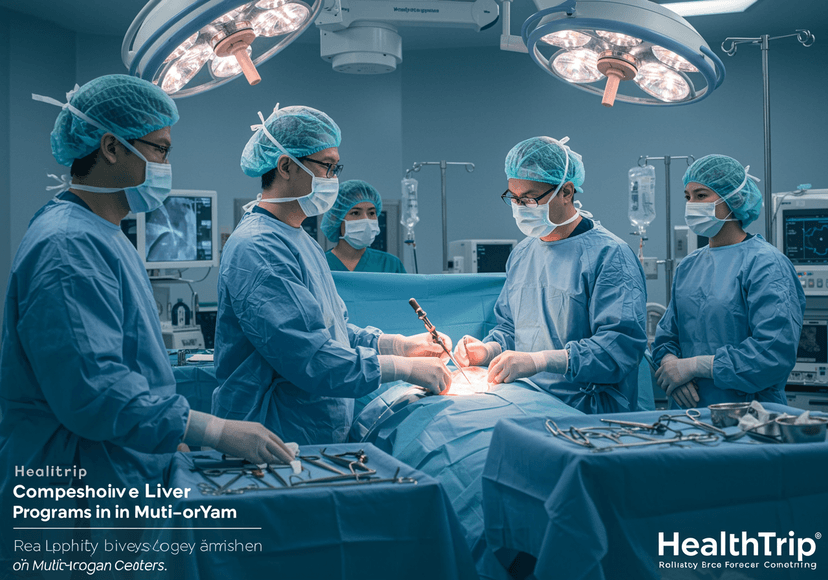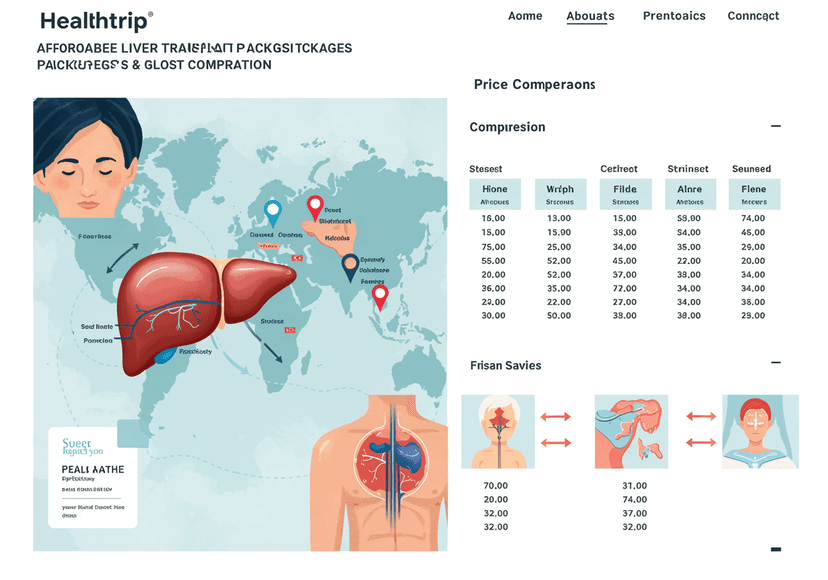
Pediatric vs. Adult Liver Transplants: Key Differences and Considerations
15 Sep, 2023
 Healthtrip Team
Healthtrip TeamIntroduction
Liver transplantation is a life-saving medical procedure that has become increasingly common over the years. Liver transplants can be performed on both pediatric and adult patients, but there are significant differences in the considerations and outcomes between these two age groups. In this blog, we will explore the key distinctions between pediatric and adult liver transplants, highlighting the unique challenges and factors that medical professionals and families must take into account.
The Basics of Liver Transplantation
Before delving into the differences, let's briefly understand the fundamentals of liver transplantation. A liver transplant involves replacing a diseased or damaged liver with a healthy one from a deceased or living donor. This complex surgical procedure is often the last resort for patients with end-stage liver disease, acute liver failure, or certain liver-related genetic disorders.
Most popular procedures in India
A. Size Matters: Graft Size and Compatibility
a. Challenges in Finding Donor Organs for Pediatric Patients
One of the most critical differences between pediatric and adult liver transplants is the size of the liver graft. In pediatric liver transplantation, the available pool of donor organs is limited because the donor liver must be appropriately sized for the recipient. Children have smaller livers, so finding a suitable donor match can be challenging. As a result, pediatric patients often have to wait longer for a suitable donor organ to become available.
b. Benefits of a Larger Donor Pool for Adults
In contrast, adult recipients have the advantage of a larger donor pool, as they can receive larger grafts. This broader range of available organs can significantly reduce waiting times for adult liver transplant candidates.
Wellness Treatments
Give yourself the time to relax
Lowest Prices Guaranteed!

Lowest Prices Guaranteed!
B. Immunological Challenges
a. Pediatric Immunological Considerations
Pediatric patients undergoing liver transplantation face unique immunological challenges. Children have developing immune systems, which may react differently to foreign tissues compared to adults. Ensuring compatibility between the donor organ and the recipient's immune system is crucial to prevent organ rejection.Medical professionals carefully assess immunological factors in pediatric liver transplantation, often using advanced immunosuppressive medications tailored to a child's specific needs. Balancing the need to suppress the immune system to prevent rejection while avoiding excessive immunosuppression is a delicate task.
b. Adult Immunological Considerations
In adult liver transplantation, immunological considerations are still essential but differ from those in pediatric cases due to the more mature immune system of adult recipients.
C. Long-Term Outcomes and Growth
a. Growth and Development Challenges for Pediatric Patients
Long-term outcomes and considerations also differ significantly between pediatric and adult liver transplant recipients. Pediatric patients who receive liver transplants may face unique challenges related to growth and development. The transplanted liver can grow along with the child, but this process requires close monitoring and potential adjustments to medication dosages.
b. Growth and Development Challenges for Pediatric Patients
For adult recipients, the focus is more on maintaining a stable and functional graft, managing potential complications, and optimizing overall health. While growth is not a concern, long-term medication management and the risk of age-related comorbidities become more significant considerations.
D. Psychological and Social Aspects
a. Pediatric Patient and Family Psychological Challenges
Both pediatric and adult liver transplant patients, along with their families, must navigate the psychological and social aspects of transplantation. However, the impact of these factors can vary between the two groups. Pediatric patients may struggle with the concept of transplantation and the potential need for multiple surgeries as they grow. Families must provide ongoing support and education to help children understand their medical condition and the importance of adherence to medication and follow-up care.
b. Adapting to a "New Normal" for Adult Recipients
In contrast, adult recipients often have a better understanding of their health condition and may face the challenges of adapting to a "new normal" after transplantation, which can include changes in lifestyle, employment, and relationships.
E. Advancements in Pediatric Liver Transplantation
Over the years, advancements in medical technology and surgical techniques have significantly improved the outcomes of both pediatric and adult liver transplantation. These innovations have led to reduced waiting times, better graft survival rates, and fewer complications for patients in both age groups.
Pediatric Liver Transplants
a. Split Liver Transplants:
To address the challenge of finding appropriately sized donor organs for pediatric patients, surgeons have developed techniques like split liver transplantation. In this procedure, a single donor liver is divided into two parts, allowing it to benefit both a child and an adult. This innovation has expanded the donor pool for pediatric patients.
b. Living Donor Transplants:
In some cases, living donors, typically a parent or close relative, can donate a portion of their liver to a child in need. Living donor liver transplantation is more common in pediatric cases, as the size match is crucial.
c. Immunosuppression Research:
Ongoing research into immunosuppressive medications has led to more effective and targeted therapies for pediatric patients. This helps to minimize the risk of organ rejection while reducing side effects.
Adult Liver Transplants
a. Advancements in Surgical Techniques:
Surgical procedures for adult liver transplantation have become more refined, leading to shorter surgery times and reduced complications.
b. Improved Organ Preservation:
Innovative techniques for organ preservation have extended the viability of donor livers, increasing the chances of successful transplants.
c. Antiviral Medications:
Many adult liver transplant candidates have liver disease related to viral infections like hepatitis C. The development of highly effective antiviral medications has improved outcomes for these patients both before and after transplantation.
F. Considerations for the Future
As medical science continues to advance, there are several considerations for the future of liver transplantation in both pediatric and adult populations:
a. Precision Medicine:
Tailoring treatment plans and immunosuppressive therapies to individual patient needs, based on genetic factors and immune system characteristics, may become more common.
b. Organ Preservation:
Continued research into organ preservation methods may extend the availability of donor organs and improve transplant outcomes.
c. Regenerative Medicine:
The field of regenerative medicine holds promise for developing techniques to repair or regrow damaged liver tissue, potentially reducing the need for transplantation
d. Psychosocial Support:
Enhancing the support systems for both pediatric and adult transplant recipients and their families can improve overall well-being and adherence to post-transplant care.
e. Ethical Considerations:
As medical advancements continue, ethical discussions around issues like organ allocation, living donor considerations, and the use of emerging technologies will become increasingly important.
Conclusion
In conclusion, while there are distinct differences between pediatric and adult liver transplants, the ultimate goal of saving lives remains the same. Advancements in medical science, surgical techniques, and organ allocation have improved outcomes for patients in both age groups. By addressing the unique challenges and considerations of each population, medical professionals can continue to make significant strides in the field of liver transplantation, offering hope and a second chance at life to countless individuals and their families.
Related Blogs

Healthtrip:Explore Kidney Treatment Options in Mecca: Hospitals & Costs Compared
Healthtrip

Healthtrip: Your Guide to Leading Multi-Organ Transplant Centers
Healthtrip

Why Patients Choose India for Liver Transplants via Healthtrip
Healthtrip

Healthtrip: Comprehensive Liver Surgery Programs in Multi-Organ Centers
Healthtrip Transplant Centers

Healthtrip: Access World-Class Liver Transplant Specialists Globally
Medical Tourism Experts

Healthtrip: Affordable Liver Transplant Packages & Global Cost Comparison
Healthtrip Packages










